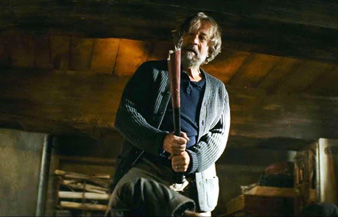The 400-Word Review: The Family
By Sean Collier
September 16, 2013
BoxOfficeProphets.com

Besson, a prolific screenwriter and somewhat more selective director, has been involved with excellent projects like Léon: The Professional, as well as abysmal ones, like Taxi. He’s written fun, memorable action flicks like Taken, and inane, forgettable ones like Unleashed. He has something of his own tone, but even it is neither definitely good or bad, it’s just recognizable.
The Family is Besson’s tribute to, and half-hearted deconstruction of, his favorite American gangster pictures (one of which cheekily enters into the proceedings.) Giovanni (Robert de Niro) is an ex-mobster shuffled around the world within the confines of the Witness Protection Program, under the purview of his exasperated handler Tom (Tommy Lee Jones). Most protected witnesses get that they have to lay low and keep on the straight and narrow; Giovanni can’t stop whacking people for minor offenses and otherwise getting himself noticed.
His family isn’t great at flying under the radar, either. Wife Maggie (Michelle Pfeiffer) burns down a supermarket that scoffs at her request for peanut butter. Daughter Belle (Dianna Agron) perpetrates a nifty assault/grand theft auto combo in response to an untoward advance. And son Warren (John D’Leo) is a budding don, dabbling in criminal enterprises schoolwide.
The Family splits its time between a quartet of interests that never fully intertwine: Giovanni and Maggie’s attempts to normalize; Belle and Warren’s attempts to rebel; Giovanni’s urge to tell his story; and the encroaching threat of the mafiosos that have Giovanni on the run. Some threads work well; the story about the kids is a refreshing twist on the “Sopranos” playbook, with children happy and eager to enter the family business. And Giovanni’s solo activities, including an ill-advised decision to pen his memoirs, are amusing and engaging.
The greater drama — which, unfortunately, is the foundation of the film’s dramatic conflict — doesn’t quite gel, though. This could be due to the many dark-comic elements that Besson uses; many scenes of slaughter (or at least maiming) are played for laughs, so when the principal cast faces danger, the audience has been thoroughly numbed to the prospect.
The performances, expectedly enough, are strong enough to keep things moving through the sludge. The Family does operate on a lower plane than the classic mafia flicks it cherishes, but works as an entertaining diversion.
Sean Collier is the Associate Editor of Pittsburgh Magazine and a member of the Broadcast Film Critics Association. Read more from Sean at pittsburghmagazine.com/afterdark